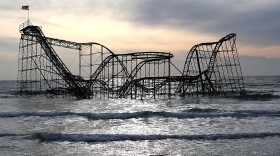
Robert Smith
Robert Smith is a host for NPR's Planet Money where he tells stories about how the global economy is affecting our lives.
If that sounds a little dry, then you've never heard Planet Money. The team specializes in making economic reporting funny, engaging and understandable. Planet Money has been known to set economic indicators to music, use superheroes to explain central banks, and even buy a toxic asset just to figure it out.
Smith admits that he has no special background in finance or math, just a curiosity about how money works. That kind of curiosity has driven Smith for his 20 years in radio.
Before joining Planet Money, Smith was the New York correspondent for NPR. He was responsible for covering all the mayhem and beauty that makes it the greatest city on Earth. Smith reported on the rebuilding of Ground Zero, the stunning landing of US Air flight 1549 in the Hudson River and the dysfunctional world of New York politics. He specialized in features about the overlooked joys of urban living: puddles, billboards, ice cream trucks, street musicians, drunks and obsessives.
When New York was strangely quiet, Smith pitched in covering the big national stories. He traveled with presidential campaigns, tracked the recovery of New Orleans after Hurricane Katrina and reported from the BP oil spill.
Before his New York City gig, Smith worked for public radio stations in Seattle (KUOW), Salt Lake City (KUER) and Portland (KBOO). He's been an editor, a host, a news director and just about any other job you can think of in broadcasting. Smith also lectures on the dark arts of radio at universities and conferences. He trains fellow reporters how to sneak humor and action into even the dullest stories on tight deadlines.
Smith started in broadcasting playing music at KPCW in his hometown of Park City, Utah. Although the low-power radio station at Reed College in Portland, Oregon, likes to claim him as its own.
-
The U.S. and Russian men's hockey teams played at the same time on Thursday. The teams will meet on the ice Saturday, when they will renew a storied rivalry that includes such historic games as the Miracle on Ice.
-
The American snowboarder failed in his quest to win a third Olympic gold medal in halfpipe, but there's a new star - the Russian-born, Swiss athlete known as "I-Pod."
-
The 2014 Winter Olympics officially opened Friday with a ceremony celebrating Russian culture and introducing Olympic athletes from around the world. NPR's Robert Smith was at the ceremony in Sochi and joins us to recount the pomp and pitfalls on display.
-
The first day of competition at the Sochi Olympics took place Thursday on the slopestyle course, as snowboarders took part in qualifying runs. Crowds tangled with logistical issues, but for the most part, the day was a success.
-
The Olympic sport is like gymnastics in the air, but in the final few rounds, aerialists can't use the same trick twice. Come go time, they have to figure out which trick to do, based on what their competitors have just done.
-
It's been 78 years since the U.S. brought home Olympic gold in the two-man bobsled event. After the last Winter Games, the Americans took a look at their aging sled — and decided to ditch it for a new BMW-designed one. Will it help them win gold?
-
The creation of America's central bank includes a bunch of bankers locked in a private library and a secret trip to a place called Jekyll Island.
-
When he was a kid, writer Chris Grabenstein loved tourist towns, so he set novels in one of his favorites — the Jersey shore. He says one of the great joys of writing is coming up with an interesting place to drop the body, like a roller coaster or a tilt-a-whirl.
-
The Beige Book — a big, official report — is mostly a bunch of stories gathered by talking to businesses around the country.
-
Coca-Cola is returning to Myanmar after 60 years. They'd been kept out of the country by international sanctions. This week they officially opened their new plant outside of Yangon.






